Betta fish, commonly known as Siamese fighting fish, are among the most popular choices for home aquariums. Their brilliant colors, flowing fins, and distinct personalities make them popular among fish fans. However, one of the most critical aspects of keeping a Betta healthy and happy is providing the right tank size. But what about a 2.5-gallon tank? Is it enough to meet the needs of a Betta fish? In this article, we’ll dive into the details of ” Betta fish in a 2.5-gallon tank? ” and whether it’s truly a good idea.
Betta Fish Needs
Natural Habitat and Behavior
In the wild, Betta fish are found in shallow waters such as rice paddies, slow-moving streams, and ponds in Southeast Asia. These environments are usually filled with vegetation, providing plenty of hiding spots and areas to explore. Betta fish are territorial and prefer to have their own space. While they can survive in smaller bodies of water, it’s essential to mimic their natural habitat as closely as possible to ensure their well-being.
Water Quality Requirements
Experts normally recommend a minimum tank size of 5 gallons for Betta fish. They require a temperature range of 76-82°F, a pH between 6.5 and 7.5, and low levels of ammonia, nitrites, and nitrates. Poor water quality can lead to stress and health issues, making it crucial to maintain a suitable environment.
The Debate Over Tank Size
Common Misconceptions
One of the most common misconceptions is that Betta fish can live happily in tiny bowls or small tanks. While they can survive in such conditions, it’s far from ideal. Small tanks often lead to poor water quality, limited space for swimming, and inadequate mental stimulation, all of which can negatively impact a Betta’s health and lifespan.
Minimum Tank Size Recommendations
Experts generally recommend a minimum tank size of 5 gallons for a Betta fish. This size provides enough space for the fish to swim, hide, and explore, while also making it easier to maintain stable water conditions. However, some hobbyists choose to keep their Betta in smaller tanks, such as 2.5 gallons. So, what are the advantages and disadvantages of this choice?
The 2.5 Gallon Tank: Pros and Cons
Pros:
Space Efficiency
A 2.5-gallon tank is compact and can fit in small spaces, making it an appealing option for those with limited room. It’s also easy to set up and doesn’t require much equipment.
Cost-Effectiveness
Smaller tanks are generally less expensive than larger ones, both in terms of initial setup and ongoing maintenance costs. They require less water, fewer decorations, and smaller filtration systems.
Cons:
Limited Space
The most significant drawback of a 2.5-gallon tank is the limited space it offers. Betta fish are active swimmers and enjoy exploring their environment. A small tank can restrict their movement and lead to boredom and stress.
Difficulty Maintaining Water Quality
Maintaining stable water parameters in a 2.5-gallon tank can be challenging. The smaller the tank, the more quickly water quality can deteriorate. Even slight changes in temperature, pH, or ammonia levels can have a significant impact on the fish.
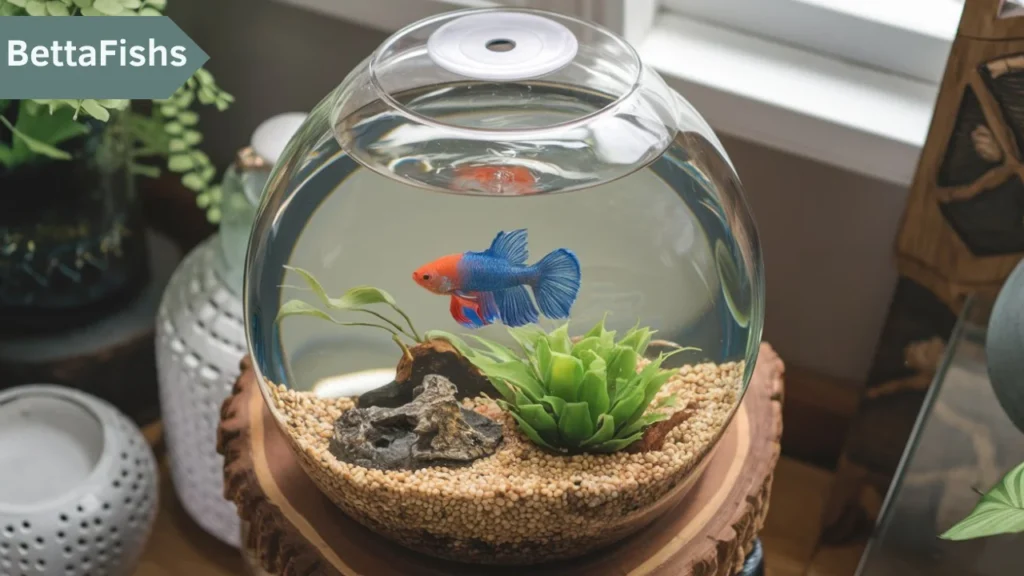
Creating a Suitable Environment in a 2.5 Gallon Tank
Substrate and Decorations
Choosing the Right Substrate
The substrate in your tank not only adds to the aesthetic appeal but also plays a role in maintaining water quality. Gravel or sand is commonly used, but it’s essential to choose a substrate that doesn’t trap debris, which can lead to poor water conditions.
Adding Plants and Hiding Spots
Live plants are a great addition to a Betta tank as they provide oxygen and create a more natural environment. Plants like java moss, anubias, and marimo moss balls are low-maintenance options that Betta fish love. Hiding spots, such as small caves or decorations, also give your Betta a place to retreat, which can reduce stress.
Filtration and Heating
Importance of a Filter
Even in a small tank, a filter is crucial for maintaining water quality. A low-flow filter is recommended for Betta fish, as they prefer calm waters. The filter helps remove debris, toxins, and excess food, ensuring a cleaner environment.
Maintaining the Right Temperature
Betta fish are tropical species that live in warm water. A small, adjustable heater is necessary to keep the tank temperature within the ideal range. It’s essential to monitor the temperature regularly, as fluctuations can be harmful to the fish.
Lighting
Appropriate Lighting for Betta Fish
Proper lighting is important for both the health of your Betta and the growth of live plants. However, too much light can cause stress, so it’s important to balance light exposure. A simple LED light that mimics natural daylight is usually sufficient.
Water Quality Management in a 2.5 Gallon Tank
Regular Water Changes
Frequency and Process
In a 2.5-gallon tank, regular water changes are crucial to maintaining a healthy environment. It’s recommended to change 25-50% of the water once or twice a week. Use a water conditioner to remove chlorine and other harmful chemicals before adding new water to the tank.
Monitoring Water Parameters
pH Levels
Maintaining a stable pH level is essential for your Betta’s health. Regularly test the water to ensure the pH remains between 6.5 and 7.5.
Ammonia, Nitrite, and Nitrate Levels
High levels of ammonia, nitrites, and nitrates can be toxic to Betta fish. Test the water weekly and take immediate action if levels become unsafe. Regular water changes and a good filter can help keep these parameters in check.
Feeding Betta Fish in a Small Tank
Choosing the Right Diet
Betta fish are carnivores and thrive on a diet of high-quality pellets or flakes specifically formulated for them. Supplement their diet with delicacies like bloodworms or brine shrimp.
Avoiding Overfeeding
In a small tank, uneaten food can quickly degrade water quality. Feed your Betta small amounts, once or twice a day, and remove any uneaten food after a few minutes to prevent it from decaying.
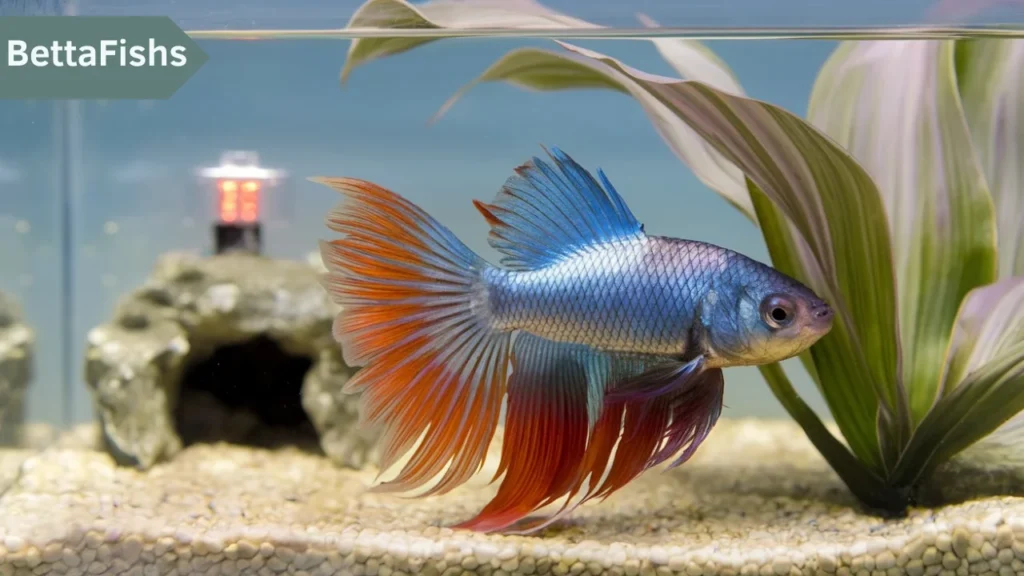
Signs of Stress in Betta Fish
Behavioral Indicators
Stressed Betta fish may display unusual behaviors such as hiding constantly, refusing to eat, or swimming erratically. These signs can indicate that something is wrong with their environment.
Physical Symptoms
Physical signs of stress include faded colors, clamped fins, and lethargy. If you notice these symptoms, it’s important to check the water quality and tank conditions immediately.
Common Health Issues in Small Tanks
Fin Rot
Fin rot is a common issue in Betta fish, often caused by poor water quality. It appears as ragged, discolored fins and can be treated with clean water and appropriate medications.
Swim Bladder Disorder
Swim bladder disorder affects a fish’s ability to swim properly and is often linked to overfeeding or constipation. Fasting your Betta for a day or two and then offering a cooked pea can help alleviate the problem.
Ammonia Poisoning
Ammonia poisoning is a serious condition caused by elevated ammonia levels in the tank. Symptoms include gasping for air at the surface, red or inflamed gills, and lethargy. Immediate water changes and ammonia-neutralizing products are necessary to save your fish.
Tips for Keeping Betta Fish Healthy in a 2.5 Gallon Tank
Maintaining Cleanliness
Regularly clean the tank, remove debris, and perform water changes to keep the environment healthy. A clean tank is essential for preventing disease and stress.
Providing Mental Stimulation
Betta fish are intelligent creatures that benefit from mental stimulation. Add new decorations or rearrange the tank setup occasionally to keep your Betta engaged and curious.
Alternatives to a 2.5 Gallon Tank
5 Gallon Tank: A Better Option?
A 5-gallon tank is often recommended as the minimum size for Betta fish. It provides more space for swimming and decorations, making it easier to maintain stable water conditions.
The Benefits of a Larger Tank
Larger tanks are easier to manage and offer a more stable environment. They also provide more opportunities for adding plants, decorations, and even compatible tank mates.
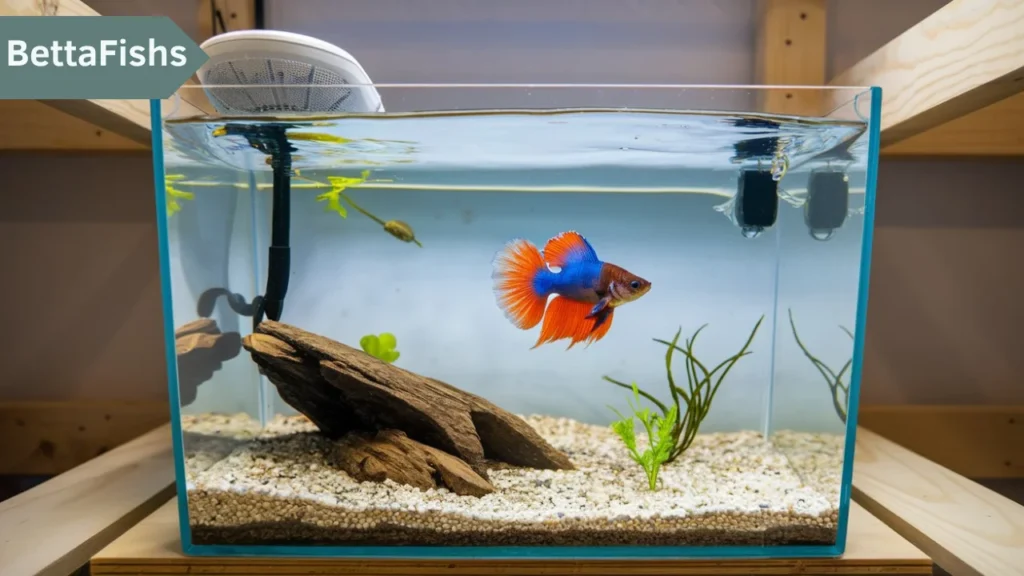
How to Upgrade to a Larger Tank
Preparing for the Transition
Before upgrading, set up the new tank with all necessary equipment, decorations, and water treatment. Allow the tank to cycle for a few days before moving your Betta.
Moving Your Betta Safely
To move your Betta, carefully scoop them into a small container with water from their current tank. Gently transfer them to the new tank and observe their behavior to ensure they acclimate well to their new surroundings.
Conclusion
While a 2.5-gallon tank can house a Betta fish, it’s not the ideal environment for their long-term health and happiness. The limited space and challenges in maintaining water quality make it a less-than-ideal choice. If possible, opt for a larger tank that offers more space and stability. Your Betta will thrive in a well-maintained environment that mimics their natural habitat, leading to a healthier and more vibrant fish.
FAQs
Is a 2.5 Gallon Tank Big Enough for a Betta Fish?
A 2.5-gallon tank can work for a Betta, but it’s not ideal. A 5-gallon tank or larger is recommended for their well-being.
How Often Should I Clean a 2.5 Gallon Betta Tank?
You should clean a 2.5-gallon tank at least once a week, performing partial water changes and removing debris to maintain water quality.
Can I Add Other Fish to a 2.5 Gallon Betta Tank?
A 2.5-gallon tank is too small to house additional fish. Betta fish are territorial and need space, so it’s best to keep them alone in this size tank.
What Is the Ideal Temperature for a Betta in a 2.5 Gallon Tank?
The ideal temperature range for Betta fish is between 76-82°F. To keep the tank’s temperature steady, use a trustworthy heater.
How Long Can a Betta Fish Live in a 2.5 Gallon Tank?
With proper care, a Betta can live in a 2.5-gallon tank for several years, but they may thrive better in a larger tank


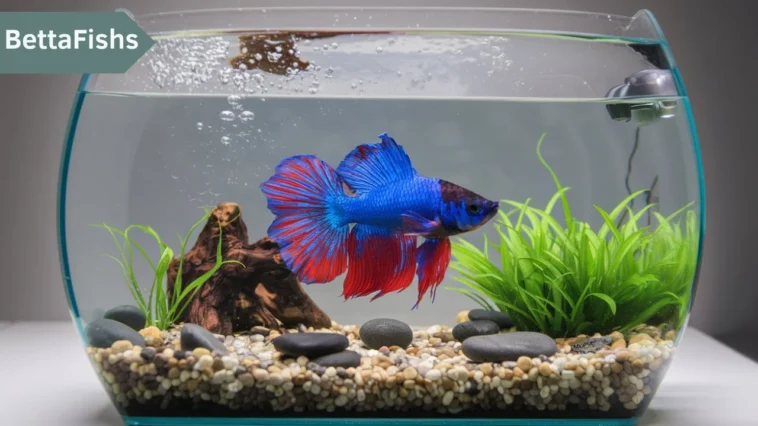
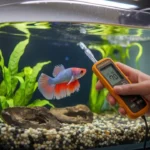
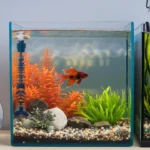
One Comment
Leave a ReplyOne Ping
Pingback:Betta fish water change schedule